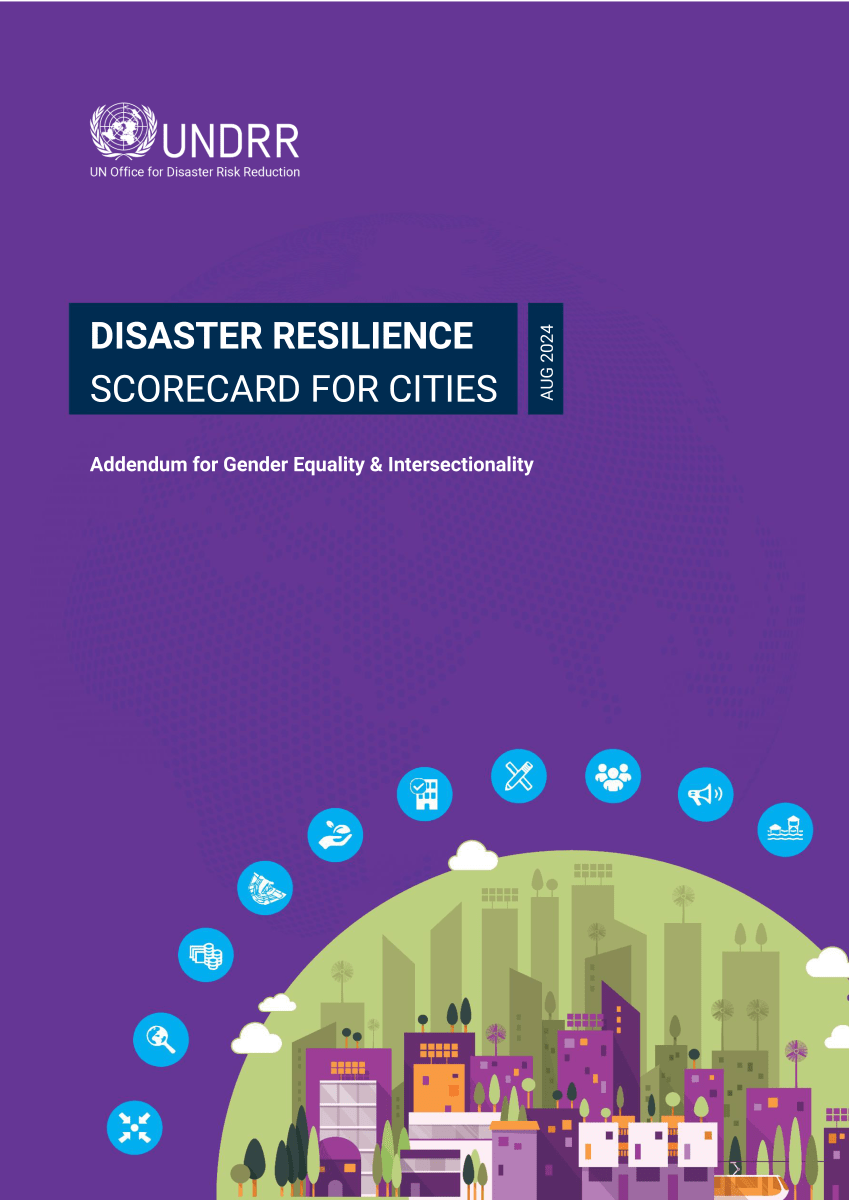Disaster Resilience Scorecard for Cities: Addendum for Gender Equality and Intersectionality

Disaster Resilience Scorecard for Cities: Addendum for Gender Equality and Intersectionality
Disasters discriminate. Not because certain population segments are inherently vulnerable per se, but rather because their voices may not be equally heard in decision-making processes and, thus, they may be more exposed to factors that can increase their vulnerability.
Gender inequalities exist in every society across the globe. Gender discrimination can impact the control that women and girls have over the decisions that govern their lives, as well as their access to resources and opportunities, which heightens exposure to risk and can result in disasters having a disproportionate impact on women and girls. But equally, ideas and understandings of masculinities and the roles and responsibilities of men in a society can result in men and boys experiencing higher mortality in some disaster contexts. Understanding the impact of gender norms, roles and relations on people’s lives within a given culture and society is critical to reducing disaster risk. This in turn supports better informed and more representative disaster risk management and risk reduction that strengthens everyone’s resilience, be it women and men, girls and boys, and persons of diverse gender identities.
This Scorecard Addendum for Gender Equality and Intersectionality aims to incorporate a gender perspective into disaster risk reduction (DRR), acknowledging and addressing the gender-specific impacts of disasters and needs in resilience-building. Adopting an intersectional and human-rights-based approach, it looks towards recognition, autonomy and empowerment as an integral part of the development of local resilience strategies, with a view to strengthening cities that are increasingly resilient and inclusive.
It includes criteria on gender equality through a total of 27 questions/indicators as per the Ten Essentials for Making Cities Resilient that were designed to support the implementation of the Sendai Framework at the local level. Each indicator can be assessed by a score of 0 to 3, where 3 is the maximum possible score.
It is recommended for use in a half to full day multi-stakeholder participative workshop, gathering representative from all relevant sectors – e.g., municipal departments, civil society organizations, private sector representatives, academia and scientific institutions, community leaders. The scoring of each indicator should result from a debate between participants on which answer best reflect the situation of their city and why. As the tool is being completed, participants are also required to take note of the rationale and provide means of verification for the answers selected. Specifically, the Addendum for Gender Equality and Intersectionality requires the participation of women’s and/or people with diverse SOGIESC’s organizations, in priority those contributing to the local agenda for DRR.
This addendum is available in different file formats:
- The Accessible PDF version is made to allow universal access to the document.
- The excel tool allows you to provide interactive scoring, take note of the assessment rationale, and provide proof for verification. The excel tool can produce the pictograms showing the results of analysis at the end which are highly useful for planning and decision making. It complements the narrative provided in the PDF version.
Disclaimer:
The authors and collaborators of this document acknowledge the following:
- There is a diversity of perspectives on how to interpret and address the gender approach across various countries, cultures, and even within different cities and towns of the same nation. As such, it is important to frame the application of this addendum within the broader cultural and legal framework in which it is to be applied.
- The current document seeks to foster open dialogue and engagement aimed at strengthening the differentiated knowledge on the underlying factors that shape municipalities and cities’ disaster risk. It does not necessarily reflect the opinions of or imply the endorsement of the United Nations, UNDRR, and MCR2030 partners.
For more information:
1. Gender inequality in DRR: www.undrr.org/gender
2. Sendai Gender Action Plan: https://www.preventionweb.net/sendai-framework/sendai-framework-for-disaster-risk-reduction/SendaiGAP
3. Inclusive early warning early action: checklist and implementation guide:: https://www.undrr.org/publication/inclusive-early-warning-early-action-checklist-and-implementation-guide
Download Scorecard
English
- Gender Equality and Intersectionality Addendum (Accessible PDF)
- Gender Equality and Intersectionality Addendum (Excel Tool)
Spanish
- Gender Equality and Intersectionality Addendum (Accessible PDF)

